Overview
Healthcare providers often face overwhelming administrative burdens that can detract from their ability to deliver compassionate patient care. Have you ever felt that the paperwork takes away from the time you could spend with your patients? It’s a common challenge that many in the field experience.
In response to these emotional challenges, nine innovative AI-based medical solutions have emerged, designed specifically to streamline healthcare documentation. Solutions like CosmaNeura and GetFreed AI automate essential tasks such as appointment scheduling and record-keeping. This not only enhances operational efficiency but also allows healthcare professionals to focus more on what truly matters—their patients.
The benefits of these solutions are significant. Statistics indicate notable improvements in job satisfaction and patient outcomes, reinforcing the positive impact of reducing administrative tasks. Imagine a work environment where you can dedicate more time to patient interaction, leading to better care and stronger relationships.
As you consider these advancements, reflect on how they could transform your daily practice. Embracing these AI tools may be the key to alleviating stress and enhancing your professional fulfillment. Let’s explore how these solutions can support you in your essential role in healthcare.
Introduction
In the rapidly evolving landscape of healthcare, many providers face emotional challenges that can weigh heavily on their daily routines. The integration of artificial intelligence (AI) is emerging as a transformative force, particularly in streamlining documentation processes. CosmaNeura leads the charge with innovative solutions that not only alleviate the administrative burdens faced by healthcare providers but also align with ethical principles rooted in compassion and patient-centered care.
Imagine a world where essential tasks such as patient intake, appointment scheduling, and medical record management are automated. These AI-driven platforms empower clinicians to focus more on what truly matters—their patients. As the demand for efficient and accurate documentation grows, the potential of AI to enhance the quality of care while reducing clinician burnout becomes increasingly evident.
This article delves into various AI solutions available, exploring their impact on healthcare documentation and the profound benefits they offer to both providers and patients alike. By embracing these advancements, we can foster a more compassionate healthcare environment, where providers are supported in their mission to care for others. Let's explore how AI can make a meaningful difference in your practice.
CosmaNeura: Streamline Healthcare Documentation with AI-Powered Administrative Efficiency
CosmaNeura introduces an innovative AI platform designed specifically for primary health providers who uphold Christian values. Are you feeling overwhelmed by administrative tasks? By automating essential processes such as client intake, triage, appointment scheduling, medical record management, and billing, this platform empowers medical professionals to focus more on client support rather than paperwork. This shift not only enhances operational effectiveness but also aligns with the ethical principles of Catholic teachings, ensuring that assistance remains compassionate and centered on the patient.
The platform features telehealth transcription and diagnostic support, making it a comprehensive solution for modern medical recording needs. Did you know that 50% of EU medical professionals believe AI will improve treatment quality? This sentiment resonates with CosmaNeura's mission to enhance service delivery through efficient administrative processes. Furthermore, a notable 75.7% of radiologists trust AI-based algorithms for accurate outcomes, highlighting the reliability of AI in clinical settings and reflecting the trust that CosmaNeura seeks to cultivate with its users.
Case studies reveal that AI's greatest strength lies in alleviating administrative complexity, a significant contributor to clinician burnout. CosmaNeura addresses these complexities by automating tasks like billing optimization and record-keeping, enabling providers to meet regulatory requirements more efficiently. Imagine regaining valuable hours that were once consumed by administrative duties—this leads to greater job satisfaction and improved service to individuals. AI significantly enhances administrative efficiency in primary practice, with providers increasingly recognizing the benefits of AI solutions for documentation. As the landscape evolves, CosmaNeura stands at the forefront, offering a transformative approach that aligns with the values of its users while enhancing the quality of patient care. This commitment to ethical practices ensures that the integration of AI not only boosts operational efficiency but also upholds the compassionate spirit of Catholic healthcare. To explore how CosmaNeura can streamline your administrative tasks, consider implementing today.
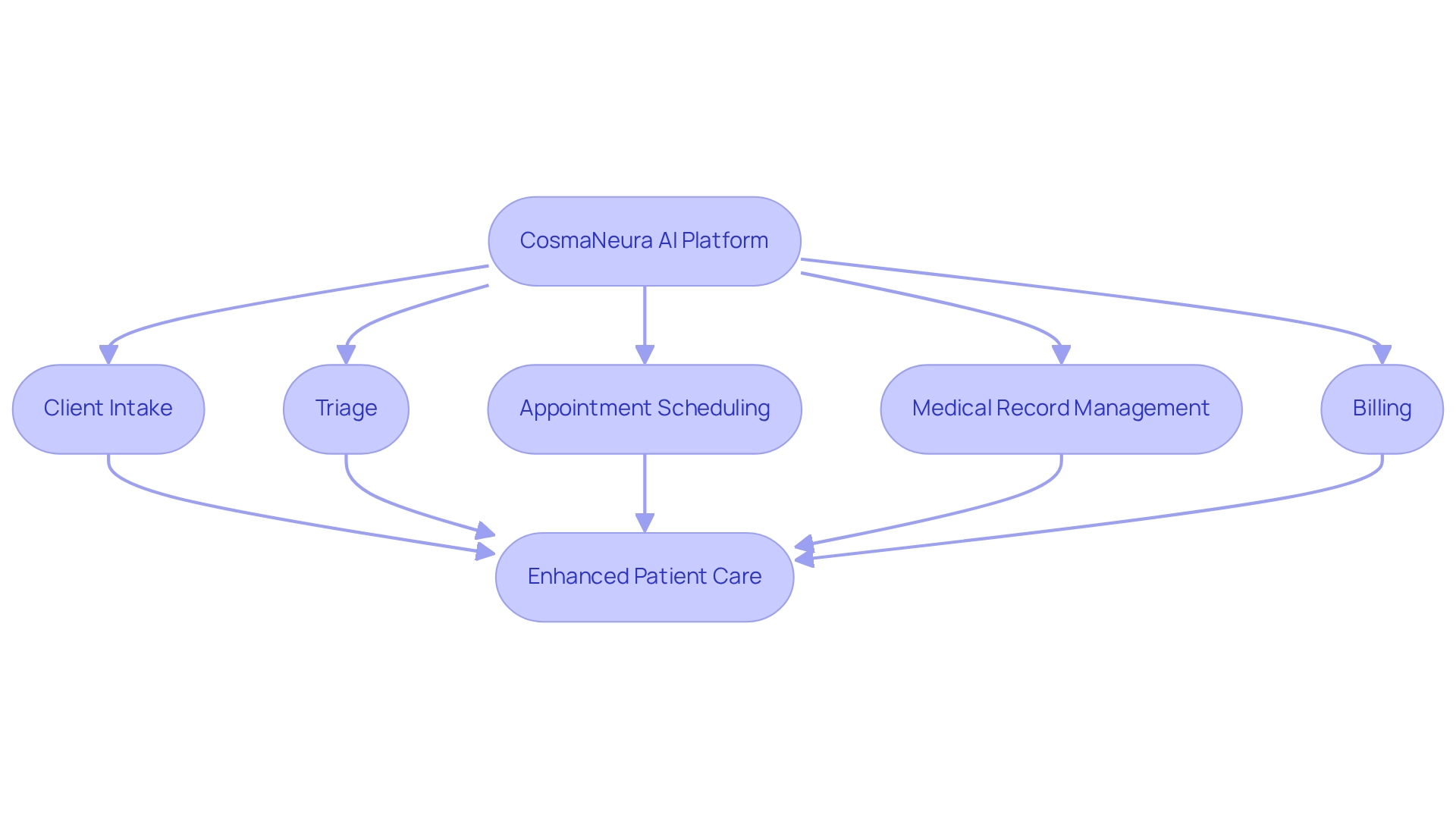
Abridge: Enhance Clinical Conversations with Enterprise-Grade AI Solutions
In today's healthcare landscape, many providers face overwhelming emotional challenges, particularly when it comes to managing administrative tasks. CosmaNeura understands these burdens and offers a compassionate solution. By utilizing enterprise-level AI charting medical solutions, it transforms clinical discussions into organized records, capturing real-time exchanges between clinicians and individuals. This ensures that essential information is not only accurately documented but also easily accessible.
Imagine a world where healthcare providers can focus on what truly matters—patient interaction—rather than being bogged down by administrative challenges. CosmaNeura simplifies the record-keeping process, allowing physicians to alleviate the burden of time-consuming tasks. By automating processes such as appointment scheduling and medical record management with AI charting medical, providers can reclaim valuable time, ultimately enhancing the quality of care they deliver.
With 91% of medical professionals expressing a need for AI-generated materials created by medical experts, CosmaNeura's integration into existing workflows becomes an invaluable asset. It empowers providers to refine their documentation practices while addressing significant challenges like physician burnout and disjointed communication. As AI-driven EHR automation progresses, clinicians can regain time previously dedicated to routine data entry, fostering that aligns with Catholic teachings, particularly through the use of AI charting medical tools.
Let us embrace these innovations together, creating a brighter future for both providers and patients alike.
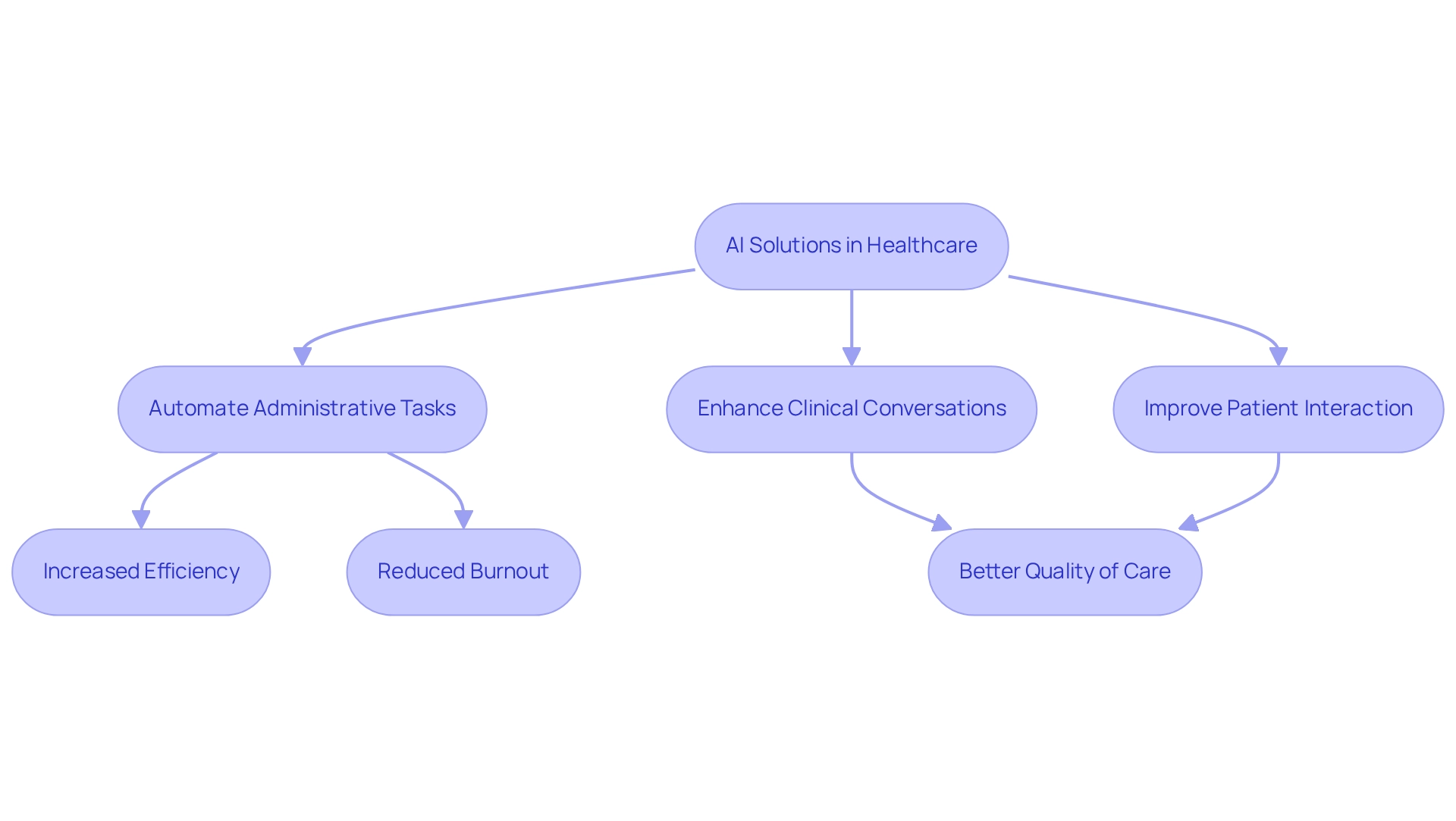
DeepScribe: Achieve Accurate Medical Documentation with AI Scribing Technology
In the demanding world of healthcare, providers often face emotional challenges that can impact their ability to deliver compassionate care. Administrative burdens can weigh heavily, detracting from the precious time spent with patients. CosmaNeura understands these struggles and offers a solution that transforms discussions into accurate clinical notes, tailored specifically for faith-focused healthcare providers, by utilizing [AI charting medical technology](https://cosmaneura.com) to capture the nuances of interactions, ensuring documentation is precise and contextually relevant within the framework of Catholic teachings. This innovative approach significantly reduces the time healthcare providers spend on note-taking, allowing them to focus more on what truly matters—their patients.
As we look toward the future, studies indicate that by 2025, 75.7% of radiologists will trust AI-based algorithms for their outcomes. This growing confidence reflects the potential of AI to enhance diagnostic accuracy and alleviate concerns among medical providers who may initially resist new technologies. Moreover, the integration of AI charting medical records has shown marked improvements in precision, with practitioners recognizing its ability to minimize record errors and enhance safety. Consider the impact: case studies reveal that AI solutions have led to a remarkable decrease in provider 'pajama time'—the time spent on administrative tasks outside of patient interactions—by 60% and 48% in different medical settings. As medical professionals continue to embrace these advancements, CosmaNeura remains dedicated to ethical practices, ensuring that AI charting medical influences clinical note-taking in a way that not only redefines medical record standards but also aligns with of Catholic services. This commitment ultimately enhances the quality of care provided to individuals. Are you ready to explore how CosmaNeura can support your journey in healthcare? Let’s work together to redefine the standards of care, allowing you to focus on what you do best—caring for your patients.
Empathia AI: Combat Clinician Burnout with Automated Documentation Solutions
Clinician burnout is a pressing concern in the medical field, and Empathia AI offers automated record-keeping solutions designed to alleviate this burden. By simplifying routine record-keeping tasks, Empathia AI allows healthcare professionals to dedicate more time to client interactions rather than administrative responsibilities. This shift not only enhances job satisfaction but also improves the overall quality of care provided.
Imagine the relief of spending notably less time on record-keeping, creating a more supportive work environment that leads to better client outcomes. Research indicates that reducing record-keeping time can free up several hours each day for providers, enabling deeper engagement with clients. As Dr. Kristine Lee observed, "The ambient AI scribe filtered out all the talk about children and pets and the exchange of Christmas greetings while producing a note that she would have had to type into the record herself." This statement underscores the efficiency of AI in diminishing clinician burnout and addressing the hesitations some doctors may have regarding new technologies.
Moreover, the case study of April Health illustrates how AI charting medical can enhance diagnostic accuracy and improve patient outcomes, aligning with the ongoing focus on clinician burnout and job satisfaction. As we approach 2025, statistics indicate continues to be a significant concern, highlighting the importance of integrating solutions like ai charting medical for enhancing automated documentation, which is crucial for fostering a sustainable and compassionate care system.
Additionally, solutions such as Droxi, which streamline EHR inbox management, exemplify how automation can alleviate administrative burdens, directly contributing to enhanced job satisfaction for medical professionals. As the landscape of medical care evolves, the commitment of platforms like CosmaNeura to uphold Catholic teachings while providing innovative AI solutions is vital in transforming the healthcare environment. Together, we can create a more empathetic and effective system of care.
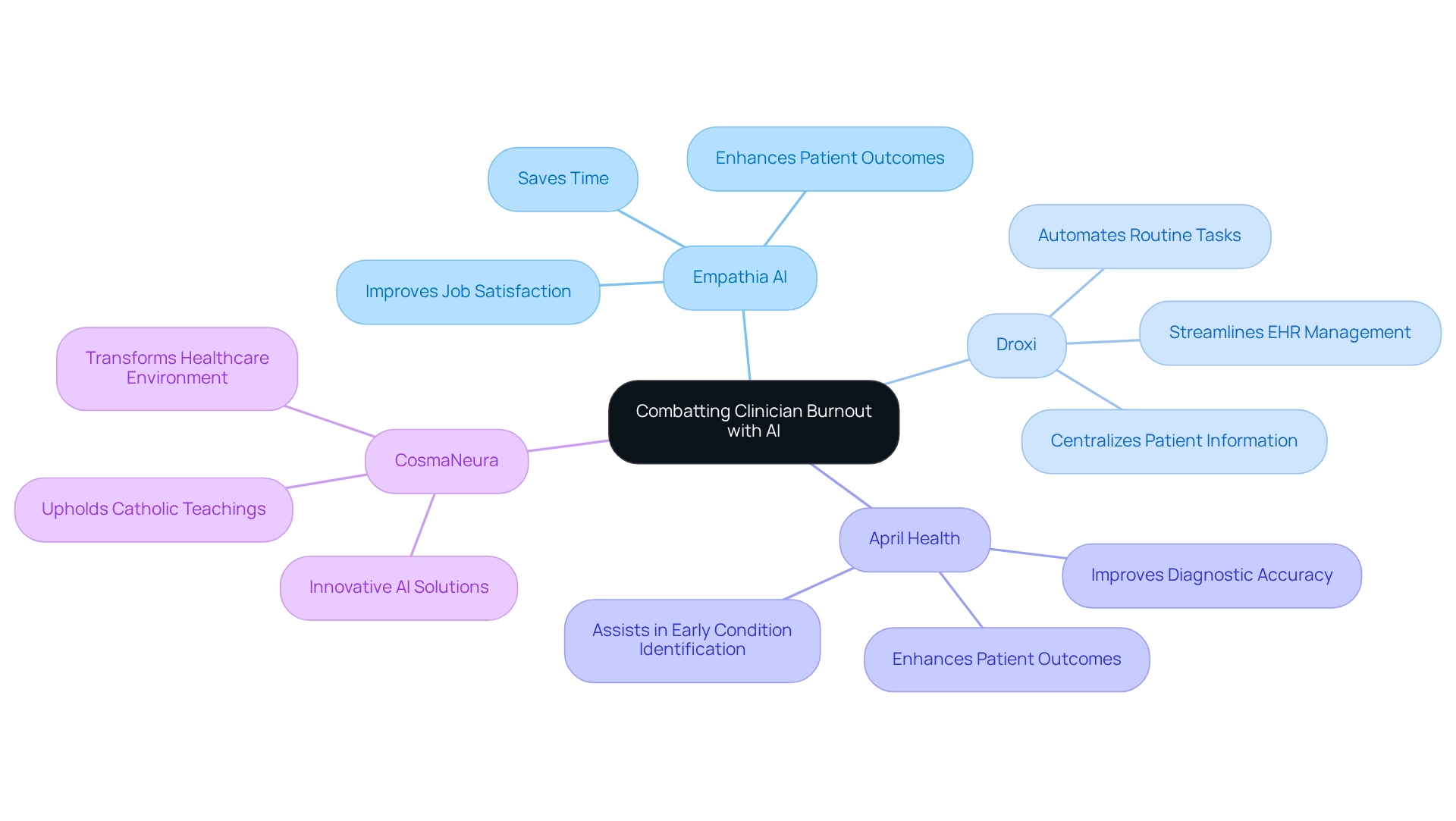
Oracle Health Clinical AI Agent: Cut Documentation Time by 30% with AI Assistance
Healthcare providers often face overwhelming administrative burdens that can detract from their primary focus: patient care. offers a compassionate solution, significantly enhancing documentation efficiency and achieving a remarkable reduction in documentation time by around 30%. By utilizing AI assistance, medical providers can swiftly capture and organize patient information, allowing them to concentrate more on clinical decision-making and care.
This increased efficiency not only boosts productivity but also enriches patient experiences. Clinicians can dedicate more time to engaging with patients rather than managing administrative tasks. In fact, 92% of clinicians report that AI assistants alleviate the burdens of electronic health record (EHR) documentation. This statistic underscores the transformative potential of AI charting medical environments, highlighting how it can support healthcare providers in their essential work. Positive feedback from medical professionals emphasizes the seamless integration of the Oracle Health Clinical AI Agent into their workflows. This fosters collaboration and enhances overall operational effectiveness, which is vital in today’s fast-paced healthcare settings. As AI technologies continue to mature, ongoing evaluation and governance will be critical to ensure their effectiveness and alignment with medical needs.
Moreover, the secure filing system offered by medical technology links professionals, promoting effective care and teamwork. By embracing these advancements, healthcare providers can alleviate some of their burdens, ultimately leading to better outcomes for patients. Let’s continue to explore how AI can transform our practices and improve the care we provide.
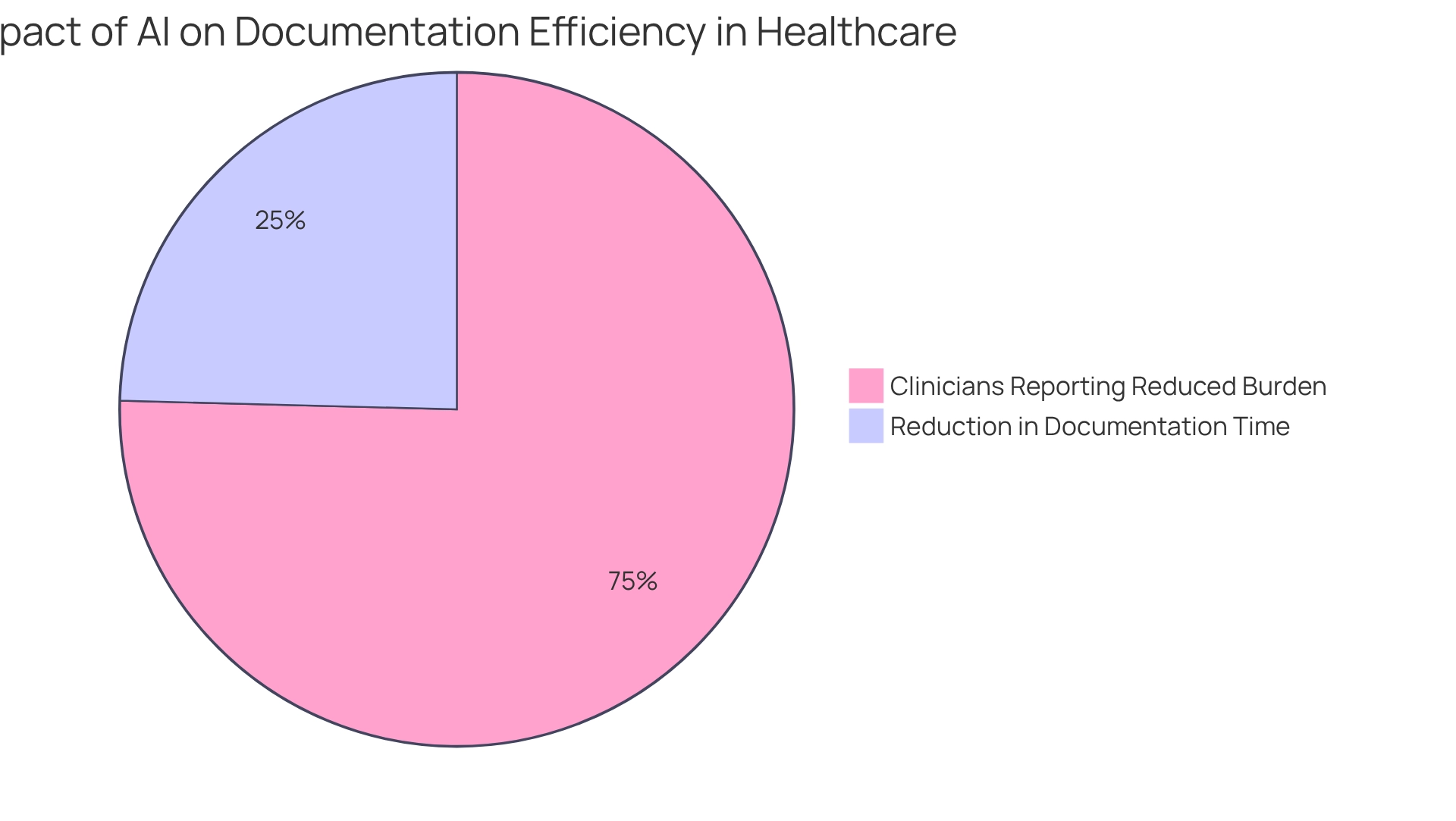
Ambience Healthcare: Comprehensive Ambient AI Solutions for Enhanced Documentation
In the demanding world of healthcare, providers often face overwhelming administrative burdens that can detract from the quality of patient care. Ambience Healthcare understands these challenges and offers innovative ambient AI solutions, such as ai charting medical, designed to ease this strain. By utilizing ambient listening technology, these solutions capture interactions in real-time, allowing for seamless and accurate documentation. Imagine a scenario where clinicians can focus more on their patients rather than being bogged down by paperwork. This shift not only alleviates the administrative load but also enhances the quality of care by ensuring that essential information is instantly accessible.
Adaptability is at the heart of Ambience's solutions, catering to the unique needs of . This makes ai charting medical tools an indispensable resource for healthcare providers striving to deliver the best care possible. Current trends reveal a significant improvement in the precision of real-time records, with studies indicating a remarkable 57% increase in electronic communications to providers since the onset of the COVID pandemic. This surge underscores the urgent need for effective record-keeping procedures capable of keeping pace with the rising volume of patient interactions, ultimately enhancing the quality of care.
Moreover, the fragmentation of medical systems often creates communication barriers that can hinder patient care. Ambience's AI charting medical solutions effectively bridge these gaps by ensuring that all relevant information is readily available to providers. As the landscape of ambient AI evolves, ongoing enhancements are anticipated, including customizable features tailored for clinicians, ensuring seamless integration into clinical workflows, especially with ai charting medical. The success of pilot programs further highlights the potential of AI technologies to enrich the physician-patient experience, paving the way for future advancements in medical record-keeping. Continuous evaluation and adaptation of AI charting medical technology will be crucial, as emphasized in the case study on future enhancements, ensuring that these solutions remain effective and relevant. As Satya Nadella wisely stated, 'AI will be an integral part of solving the world's biggest problems, but it must be developed in a way that reflects human values.' This sentiment underscores the importance of ethical considerations in the development of AI in healthcare, reminding us that technology should always serve to uplift and support the human experience.
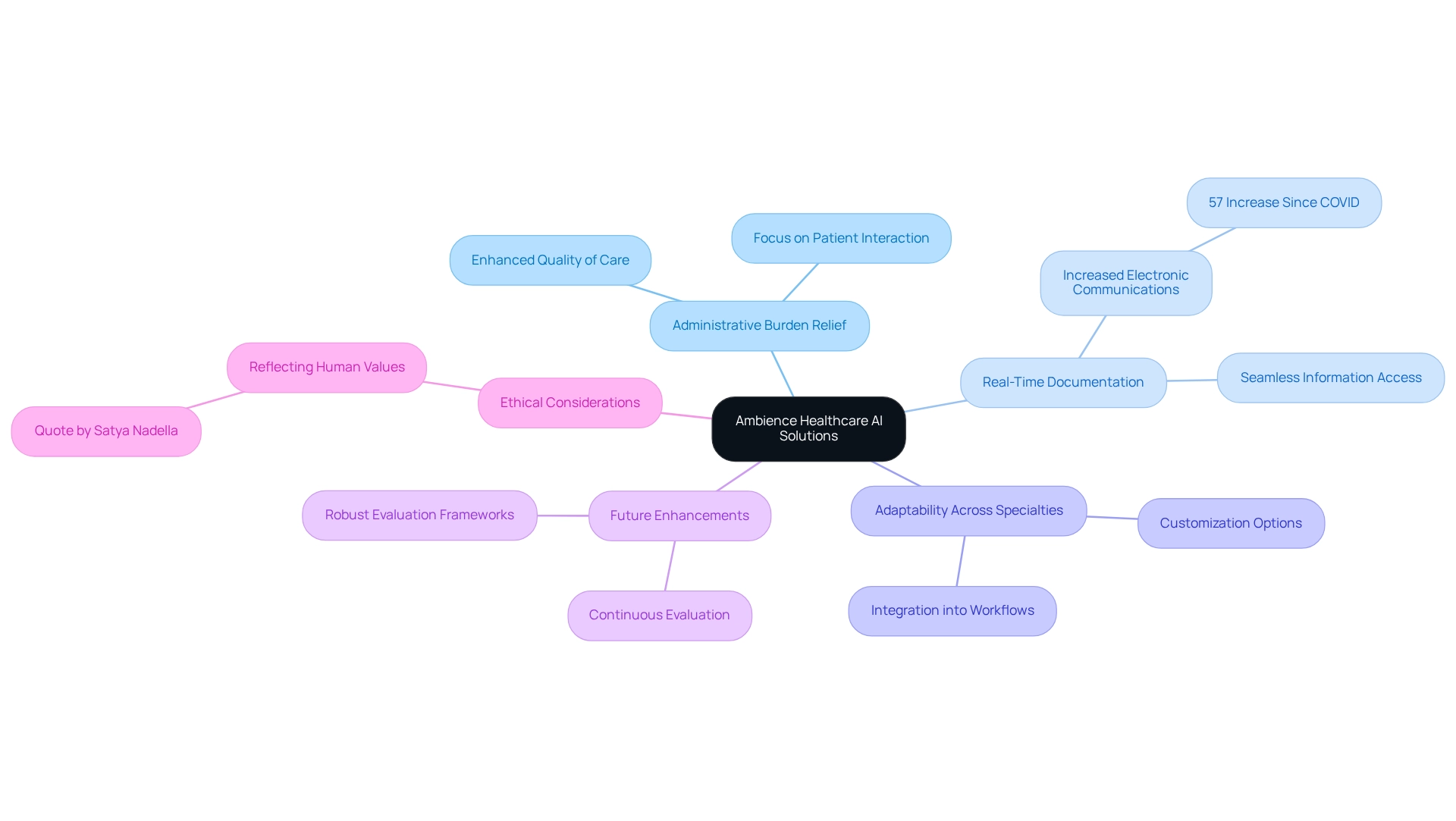
Medical Economics: Insights on Physician Experiences with AI Documentation Tools
Insights from Medical Economics reveal a profound truth: physicians integrating AI documentation tools into their practices are experiencing significant improvements in both efficiency and accuracy. Many healthcare providers share their relief as these tools considerably lighten their administrative load, allowing them to dedicate more time to caring for individuals. This shift not only enhances job satisfaction but also fosters better patient outcomes.
Consider this: a staggering 75.7% of radiologists express confidence in the results provided by AI-driven algorithms. This statistic underscores the reliability of these tools in medical record-keeping, offering reassurance to both providers and patients alike. , MD, MPH, poignantly highlights the role of manufacturers in cultivating consumer trust in AI products. He states, "It’s going to be on the manufacturers of these products to set things up to identify problems, and I would argue that to gain the trust of consumers they will need an easy way to report problems and get answers if there is a problem."
Furthermore, Dr. Kissi Rosabel Blackwell brings attention to the affordability of AI documentation systems, a crucial factor for primary care physicians often navigating financial constraints. These insights collectively emphasize the vital role of AI charting medical solutions in addressing the evolving needs of medical providers. By embracing these advancements, we can promote a more efficient and compassionate healthcare environment, ensuring that providers can focus on what truly matters—their patients.
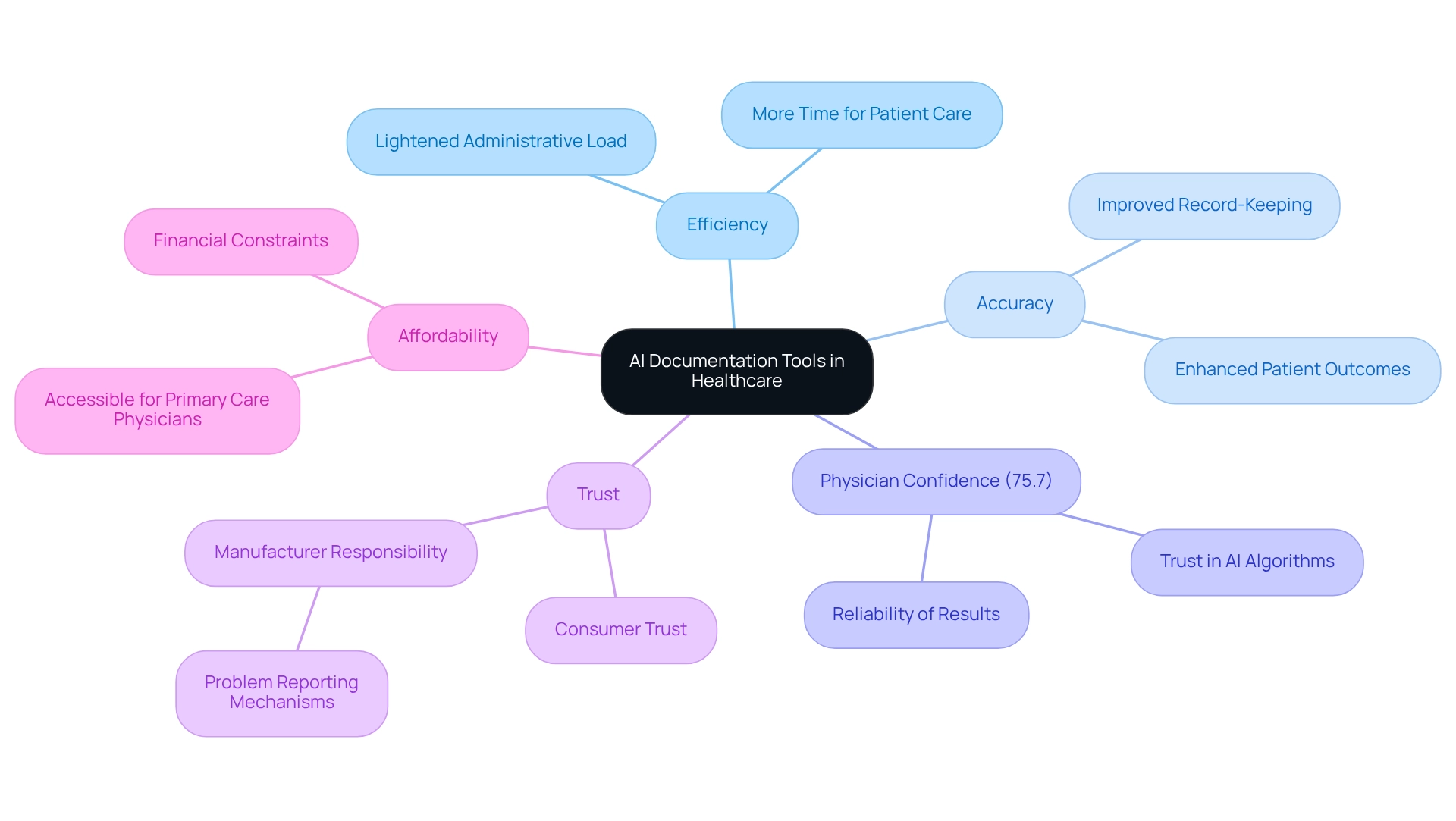
Lindy AI: Transform Healthcare with Safe and Accurate AI Medical Charting
Lindy AI is at the forefront of transforming medical services, driven by a commitment to safe and precise AI charting medical solutions. Imagine the relief for healthcare providers when clinical notes are not only accurate but also contextually significant—this is crucial for maintaining high standards in care and record-keeping. In 2025, the importance of precision in AI charting medical solutions has become increasingly vital, especially considering that 43% of Americans still prefer human interaction in medical settings. This highlights the urgent need for technology that complements rather than replaces the human touch in healthcare.
are thoughtfully designed to integrate seamlessly into existing workflows, providing essential tools that empower providers to enhance their record-keeping processes while prioritizing safety. Expert insights suggest that precise AI documentation can significantly reduce the risk of medical errors, thereby improving overall quality of care. As Matthew Ko, co-founder of Lindy AI, shares, "Our technology has been trained on one of the world’s largest databases of discussions, enabling it to handle a wide range of medical scenarios and specialties."
Yet, public sentiment surrounding AI's role in medical quality remains mixed, as highlighted in the case study titled "Concerns About AI's Impact on Medical Quality." This underscores the importance of ensuring that the integration of AI leads to improved patient care, rather than unintended negative consequences.
Lindy AI remains steadfast in its mission to simplify record-keeping while fostering a safer, more efficient medical environment. For medical service providers contemplating these technologies, Lindy AI offers competitive pricing options, with plans starting at approximately $99/month for non-integrated use. By embracing AI solutions, providers can enhance their record-keeping procedures while nurturing the vital human connection that is essential in healthcare.
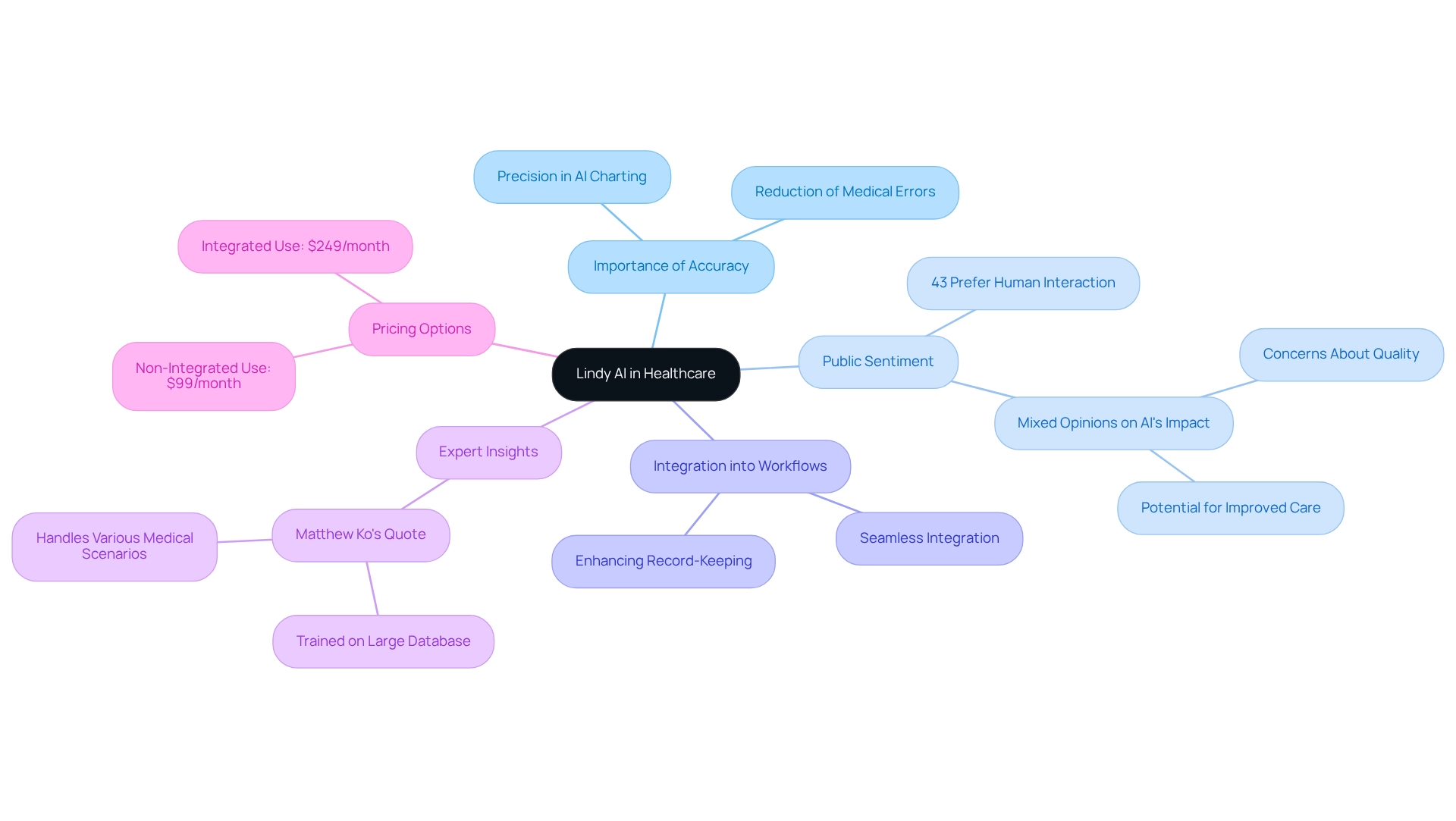
GetFreed AI: Simplify SOAP Notes with Fast and Accurate AI Solutions
Healthcare providers often face overwhelming administrative burdens that can detract from their ability to deliver compassionate care. Have you ever felt that the time spent on paperwork takes away from ? GetFreed AI excels in streamlining the creation of SOAP notes through its rapid and precise solutions, enabling medical providers to create detailed notes in a fraction of the time. This automation significantly decreases the hours dedicated to record-keeping, enabling clinicians to focus more on patient care, ultimately enhancing the quality of service.
Imagine a world where your time is spent nurturing patient relationships rather than drowning in paperwork. GetFreed AI's solutions are designed for seamless integration with existing electronic health record systems, making them an ideal choice for medical providers eager to improve their record-keeping processes. Statistics suggest that by 2025, solutions involving AI charting medical could enhance efficiency by as much as 75%. This highlights the transformative potential of automated records on clinician productivity.
Moreover, 66% of surveyed doctors recognize the advantages of utilizing AI in healthcare, reflecting a growing acceptance of these technologies. As healthcare professionals increasingly trust AI charting medical technologies, with 75.7% of radiologists relying on AI-based algorithms, we are on the brink of redefining medical documentation. However, it's important to acknowledge the concerns regarding AI's impact on the patient-physician relationship, as 39% of respondents express apprehension. How can we address these concerns while embracing innovation?
Despite these challenges, the positive outlook on AI, as illustrated in the case study 'Healthcare Professionals' Confidence in AI,' demonstrates its potential to improve clinical practices and outcomes for individuals. GetFreed AI specifically addresses the fragmentation of services by providing tools that enhance communication and coordination among providers, ultimately improving patient experiences. As Nigam Shah, a professor of medicine at Stanford University, points out, the challenges of deploying AI models highlight the need for effective solutions like GetFreed AI in the healthcare sector. Together, we can overcome resistance to innovation and enhance patient-centric care.
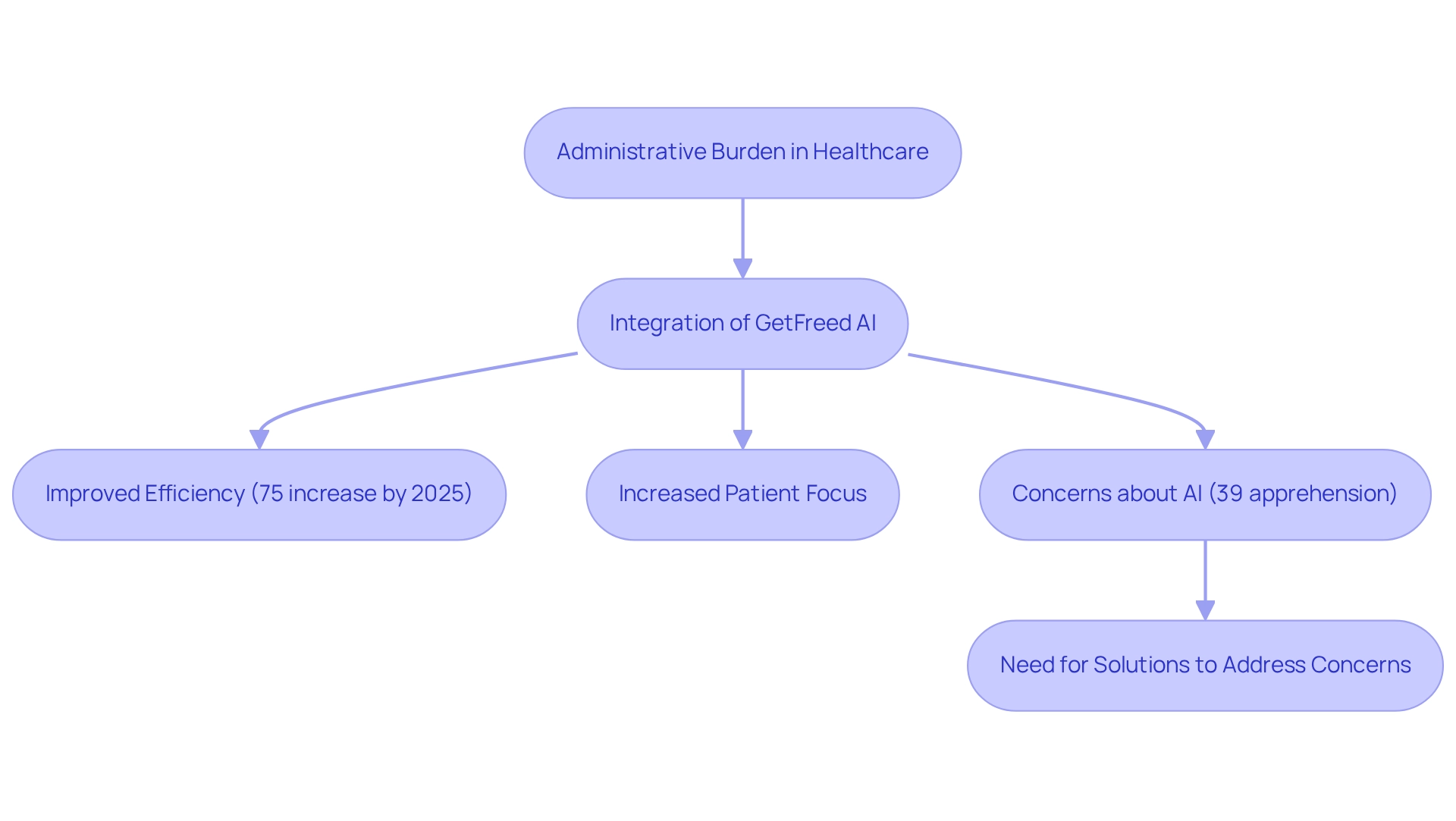
Conclusion
The integration of artificial intelligence in healthcare documentation marks a significant shift towards enhancing operational efficiency and improving patient care. By automating essential administrative tasks—from patient intake to medical record management—AI solutions, like those offered by CosmaNeura and other innovative platforms, enable healthcare providers to focus more on their patients and less on paperwork. This transition alleviates the burdens of clinician burnout and aligns with ethical principles that prioritize compassionate, patient-centered care.
Throughout this discussion, we have highlighted the profound benefits of AI-driven documentation tools. These technologies not only streamline processes but have also built significant trust among healthcare professionals. Many express confidence in AI's ability to improve treatment quality and diagnostic accuracy. The chance to reclaim valuable time lost to administrative duties enhances job satisfaction among clinicians, fostering a healthier work environment and better patient outcomes.
As the healthcare landscape continues to evolve, embracing AI solutions is not merely an option; it is essential for nurturing a sustainable and compassionate healthcare system. By prioritizing ethical practices and addressing the needs of healthcare providers, AI technologies hold the potential to redefine the standards of medical documentation. Our commitment to thoughtfully integrating these solutions ensures that the future of healthcare remains focused on what truly matters: the well-being of patients and the fulfillment of healthcare providers in their noble mission to care for others.




